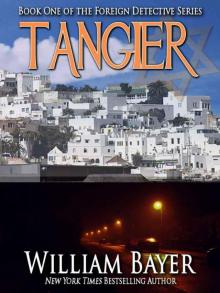Tangier, a sweeping novel of romance and intrigue set in a fabled North African resort, may remind readers of the Alexandria Quartet. In this book Tangier is more than just a place; it is a city of unholy loves. Titled Europeans, Moroccan hustlers, aging former Nazis, decadents of every sort play out their rituals, competing for stunning lovers and social power.Their schemes and passions are a subject of fascination to the hero of the book, a brilliant young police inspector. But even as he is fascinated he is also repelled, searching always to understand the privileged foreign colony, to unravel its weave of secrets. He finds the key, finally, in the person of a beautiful Eurasian woman, whose own mysterious past he manages to unveil. Through her eyes he comes to see Tangier in a new way. Sustained by her love he rediscovers the city and finds a different role in it for himself.Against the drama of this love story other characters emerge: An America Consul becomes embroiled in an affair with his Vice-Consul's wife. A retired British character actor strives to preserve his dignity as his friends betray him and he feels an intimation of his death. A Canadian gossip columnist struggles not to lose himself in the gay world of Tangier. There is a young Frenchman corrupted by his love for an older woman; a radical Arab surgeon; a fifth-rate Soviet spy-a "burnt-out case"; squabbling writers; cruel social arbiters; a male prostitute named "Pumpkin Pie".Watched closely by the police inspector as they slip in and out of each others' lives, these and other characters ignore the storm that gathers slowly above their town. In the end it sweeps them up with dizzying force. Tangier is revealed in a violent and dazzling finale.PRAISE FOR TANGIER—Publisher’s Weekly: “Colorful - panoramic - an atmospheric novel of conflict, vengeance, intrigue and deceit against the exotic background that is Tangier - a novel which also possesses genuine psychological insights.” —Washington Post: “The city is the main character of this intricate novel in which East and West meet convulsively and with mutual puzzlement. William Bayer keeps scrupulously the narrative promises he has made and implied, the strands woven so cleverly and in such complex patterns, dyed with a strong influence of atmosphere, that one proceeds willingly, even hastily, through the close-packed pages. As the pages turn and evidence accumulates, its hard to avoid the conclusion that what we have on our hands is the work of a moralist. Bayer conceals what he is up to with considerable skill until the reader is firmly hooked and it is too late to back out.” —Erie PA Times: “You can’t possibly read the novel Tangier by William Bayer without wanting someday to visit this exotic North African city. Tangier would be worth reading if it were nothing more than a novel of mood, a travelogue, in effect, describing one of the most mysterious cities in the world. But Bayer’s Tangier is much more than that; it is also a fine thriller and a psychological novel of considerable insight.” —Cleveland Plain Dealer: “Tangier is a compulsive page-turner. Once you begin this exotic, erotic novel about the foreign colony in the Moroccan city of the title, you’ll not be able to stop. In short, William Bayer’s Tangier contains all the ingredients a reader could ask of an atmospheric action novel. But the book is more, a psychological novel of extraordinary insights. This is a novel that stays in the mind.” — Los Angeles Times: “The graceful prose is as dazzling as the white washed city in full sun...” —Harvard Magazine: “Titled Europeans jostle Moroccan hustlers and aging Nazis in an unremitting struggle for lovers and social power. Atmospheric fiction tinged with cynicism.”
List Chapter or Page:
Page 1Page 2Page 3Page 4Page 5Page 6Page 7Page 8Page 9Page 10Page 11Page 12Page 13Page 14Page 15Page 16Page 17Page 18Page 19Page 20 View More >> The Wicked Godmother: A Novel of Regency England - Being the Third Volume of A House for the Season
The Wicked Godmother: A Novel of Regency England - Being the Third Volume of A House for the Season Dragnet
Dragnet Wicked Wolff
Wicked Wolff Bedelia
Bedelia Tremor: If your world was falling apart, how far would you go to save it? (The Tremor Cycle)
Tremor: If your world was falling apart, how far would you go to save it? (The Tremor Cycle) House Revenge
House Revenge The Forgotten Home Child
The Forgotten Home Child Down & Dirty: Crow: Dirty Angels MC, book 10
Down & Dirty: Crow: Dirty Angels MC, book 10
